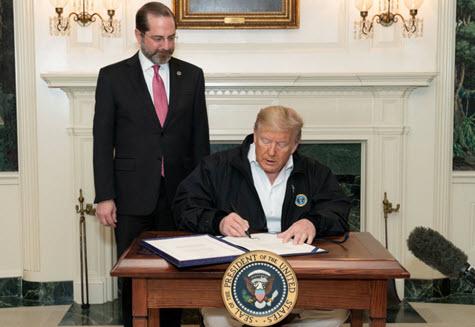
This week congressional policymakers overwhelmingly passed, and President Trump signed, an $8.3 billion emergency spending package to combat the coronavirus outbreak in the U.S. – after the Fed reduced interest rates by a half-point amid early signs of economic disruption.
- The president signed the emergency funding bill Friday morning. “We’ve signed the 8.3 billion,” Trump said. “I asked for two and a half and I got 8.3 and I’ll take it.” (The Hill, March 6) Photo above: President Trump, with Secretary of Health and Human Services Alex Azar, signs the coronavirus bill into law.
- The package – H.R. 6074 (116) – will bolster vaccine development and research, increase equipment stockpiles, and support state and local health responses to a virus that has sickened more than 160 people in more than a dozen states. (NY Times U.S. coronavirus map and Center for Disease Control and Prevention updates)
- As questions remain about the severity and spread of the illness, the stock market continued to experience historic gyrations this week, with falling yields exerting wide-ranging effects on borrowing costs and bank profitability. (Wall Street Journal, March 5)
- In an effort to contain the coronavirus's economic fallout, Fed Chairman Jay Powell announced on March 3 a cut in the federal funds rate cut to a range of 1 to 1 ¼ percent – the largest emergency cut to interest rates since the 2008 financial crisis. The Fed’s Open Market Committee is scheduled to meet again on March 17-18 to issue updated economic forecasts and any further change to the current federal funds rate.
- Powell said, "The virus and the measures that are being taken to contain it will surely weigh on economic activity both here and abroad for some time.” He added, “We are beginning to see the effects on the tourism and travel industries, and we are hearing concerns from industries that rely on global supply chains.” He added, "We don't think we have all the answers, but we do believe that our action will provide a meaningful boost to the economy." (Powell’s press conference transcript).
- The Federal Reserve’s latest nationwide survey of business conditions shows that that half of the central bank’s districts — Philadelphia, Cleveland, Richmond, Chicago, Dallas and San Francisco — were reporting impacts from the coronavirus in tourism and manufacturing chains. (The Fed’s Beige Book, March 4)
- The U.S. Travel Association (USTA) on Tuesday issued a report that supports the Fed’s findings. USTA predicts a 6 percent plunge over the next three months in international inbound travel to the United States, which could result in a loss of two to three billion dollars – the largest dip in global visitation since the financial crisis. About 79.3 million international visitors came to the U.S. last year. (USTA Travel Trends Index, March 3)
- [The Real Estate Roundtable is part of the Visit U.S. Coalition, led by the U.S. Travel Association (USTA) and the American Hotel and Lodging Association.]
- The potential impact of coronavirus on the economy and commercial real estate was part of a recent discussion between Real Estate Roundtable President and CEO Jeffrey DeBoer and Brookfield Property Partners Chairman Ric Clarke at Colorado University’s Annual Real Estate Forum (see photos here). DeBoer was also interviewed partly about the coronavirus outlook by Rosen Consulting Group’s Chairman Ken Rosen during the Pension Real Estate Association’s Spring conference this week.
- Coronavirus-related updates and resources are available to the commercial real estate industry through the RE-ISAC’s #COVID Section, which includes:
- Coronavirus Disease 2019 (COVID-19) Situation Summary, last update March 3.
- Novel Coronavirus (2019-nCoV) in the U.S., March 5 update.
The potential impact of coronavirus on the health of global markets and the U.S. economy; commercial real estate sectors and the industry’s response; and how it may affect the routines of millions in American society, will be a focus during The Roundtable’s March 31 Spring Meeting in Washington, DC.
# # #
